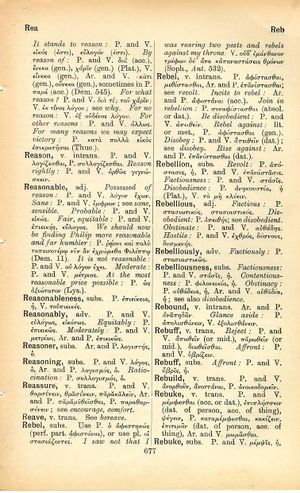rebellion: Difference between revisions
From LSJ
Τίς, ξένος ὦ ναυηγέ; Λεόντιχος ἐνθάδε νεκρὸν εὗρέ σ᾿ ἐπ᾿ αἰγιαλοῦ, χῶσε δὲ τῷδε τάφῳ, δακρύσας ἐπίκηρον ἑὸν βίον· οὐδὲ γὰρ αὐτὸς ἥσυχος, αἰθυίῃ δ᾿ ἶσα θαλασσοπορεῖ. → Who art thou, shipwrecked stranger? Leontichus found thee here dead on the beach, and buried thee in this tomb, weeping for his own uncertain life; for he also rests not, but travels over the sea like a gull.
(CSV4) |
m (Woodhouse1 replacement) |
||
| Line 1: | Line 1: | ||
{{Woodhouse1 | {{Woodhouse1 | ||
|Text=[[File:woodhouse_677.jpg|thumb|link={{filepath:woodhouse_677.jpg}}]] | |Text=[[File:woodhouse_677.jpg|thumb|link={{filepath:woodhouse_677.jpg}}]] | ||
===substantive=== | |||
[[revolt]]: [[prose|P.]] [[ἀπόστασις]], ἡ, [[prose|P.]] and [[verse|V.]] [[ἐπανάστασις]]. | |||
[[factiousness]]: [[prose|P.]] and [[verse|V.]] [[στάσις]]. | |||
[[disobedience]]: [[prose|P.]] [[ἀνηκουστία]], ἡ ([[Plato]]), [[verse|V.]] [[τὸ μὴ κλύειν]]. | |||
}} | }} | ||
Revision as of 08:58, 20 May 2020
English > Greek (Woodhouse)
substantive
revolt: P. ἀπόστασις, ἡ, P. and V. ἐπανάστασις.
factiousness: P. and V. στάσις.
disobedience: P. ἀνηκουστία, ἡ (Plato), V. τὸ μὴ κλύειν.

